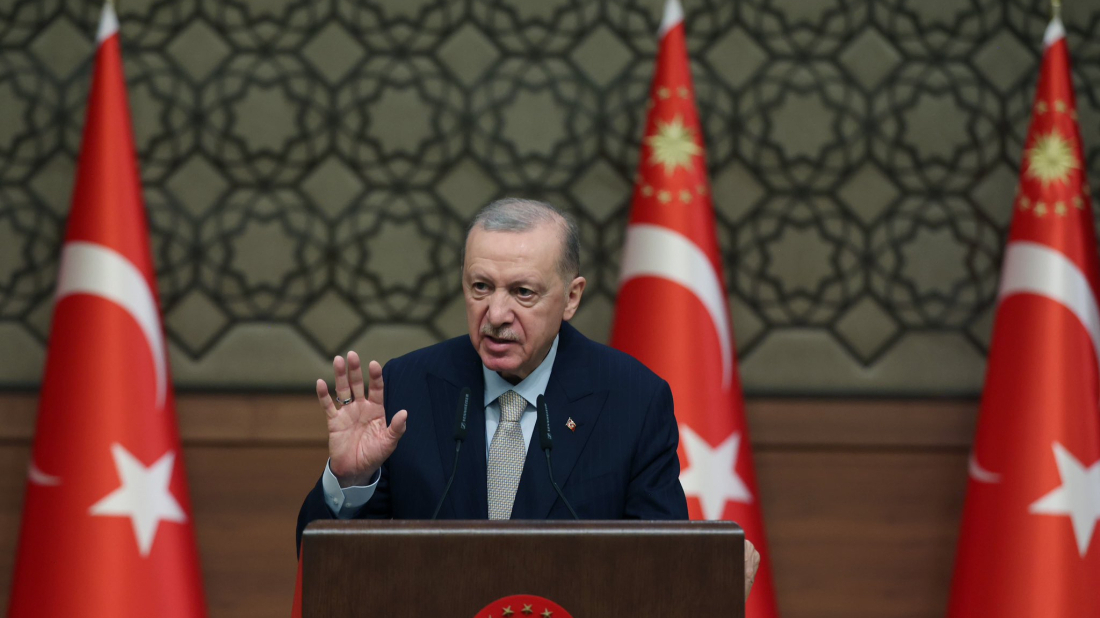Kyrgyz president dismisses security ally in major power reset
Kyrgyz President Sadyr Japarov has moved swiftly to consolidate his authority following the dismissal of his long-time ally Kamchybek Tashiev, head of...

Turkish President Recep Tayyip Erdogan has unveiled Türkiye’s 2030 Industry and Technology Strategy Document, outlining a comprehensive roadmap to boost the country’s technological independence and industrial strength.
Speaking at the launch of the 2030 Industry and Technology Strategy, President Erdoğan stated: "We aim to maximize our technological independence, ensuring that Türkiye not only develops technology but also becomes a global leader in the manufacturing and export of high-tech products."
The 2030 Industry and Technology Strategy document is aligned with the National Technology Initiative vision.The strategy focuses on key areas such as space exploration, defence, biotechnology, quantum computing, nuclear energy, and artificial intelligence.
Aerospace and defence
Türkiye is set to establish a Space Technopark to foster a robust aerospace technology ecosystem. This initiative aligns with the country's expanding space ambitions, including satellite development and deep-space research.
"We will establish a Space Technopark to build a strong ecosystem in this field," President Erdoğan stated. "Our national combat aircraft, Kaan, will enter mass production, further strengthening our defense industry."
Additionally, Erdoğan announced plans to integrate Türkiye’s air defense systems into a unified network, known as the Steel Dome, to enhance military capabilities.
'With Celik Kubbe (Steel Dome), we will consolidate our air defense systems into a single network, making them more effective and responsive,' he added."
Steel Dome is a "security umbrella" to safeguard its entire airspace from threats ranging from "very low altitude" to "very high altitude" and from "very short range" to "long range."
"We will establish a national satellite system that will bring together our capabilities in satellite production and enhance our international competitiveness," - Turkish President stated.
Quantum and artificial intelligence
The government will establish a National Quantum Institute to advance Türkiye’s expertise and research capabilities in quantum computing, a field poised to revolutionize information processing and security.
"We are creating the National Quantum Institute to strengthen our country’s human capital and research capacity in quantum technologies," President Erdoğan announced.
Additionally, the Artificial Intelligence Supercomputer Investment Program will enhance Türkiye’s AI infrastructure, accelerating progress in machine learning, automation, and data science.
"With our AI Supercomputer Investment Program, we will elevate our AI infrastructure to the next level," President Erdoğan stated.
Nuclear energy
President Erdoğan also announced the establishment of a Nuclear Technopark to drive nuclear research and develop indigenous modular nuclear reactors. This initiative aims to provide Türkiye with a sustainable and independent energy source while reducing reliance on fossil fuels.
'We will establish a Nuclear Technopark and develop our own modular nuclear reactors to make a breakthrough in nuclear energy,' Erdoğan stated.
Biotechnology and healthcare
Türkiye’s Biotechnology Production Program aims to enhance biotechnology research infrastructure and promote domestic production of biotechnological drugs.
To reduce dependency on foreign imports, public procurement will be strategically utilized to support local pharmaceutical companies.
'We will leverage public procurement to bolster domestic biotechnological drug production and strengthen our biotechnology research capabilities,' President Erdoğan stated.
Semiconductor industry
Erdogan emphasised the critical importance of semiconductor production, stating that Türkiye will carry out all stages of chip manufacturing domestically.
"Chip production is one of the most critical areas for technological independence, and we will ensure that all stages of semiconductor manufacturing take place in Türkiye," he said.
Reverse brain drain
As part of its long-term vision, Türkiye will introduce a Reverse Brain Drain Program to attract highly skilled Turkish scientists and researchers working abroad, encouraging them to return and contribute to the country’s scientific and technological advancements.
"With our Reverse Brain Drain Program, we are encouraging our talented scientists abroad to return home and continue their research in Türkiye," President Erdoğan stated.
U.S. Ambassador to NATO Matthew Whitaker said China has the power to bring an end to Russia’s war in Ukraine, arguing that Beijing is enabling Moscow’s military campaign.
Austria’s Janine Flock won the gold medal in the women’s skeleton event at the Milano-Cortina 2026 Winter Olympics on Saturday.
Iran’s Supreme National Security Council Secretary Ali Larijani said the United States could evaluate its own interests separately from those of Israel in ongoing negotiations between Tehran and Washington.
U.S. Secretary of State Marco Rubio on Sunday (15 February) called it “troubling” a report by five European allies blaming Russia for killing late Kremlin critic Alexei Navalny using a toxin from poison dart frogs.
Ukrainian President Volodymyr Zelenskyy said on Saturday that Russia’s decision to change the leadership of its delegation for upcoming peace talks in Geneva appeared to be an attempt to delay progress.
Iran’s Revolutionary Guards navy held military exercises in the Strait of Hormuz on Monday (16 February), state-linked media reported. The drill took place a day before renewed nuclear negotiations between Tehran and Washington in Geneva.
A man accused of carrying out Australia’s deadliest mass shooting in nearly three decades appeared briefly in a Sydney court on Monday (16 February), facing terrorism and murder charges over the 14 December attack on a Jewish Hanukkah celebration at Bondi Beach that left 15 people dead.
The 2026 Munich Security Conference (MSC) unfolded over three intense days in Munich, confronting a defining question of our era: has the post-Second World War international order collapsed - and if so, what will replace it?
The United States has carried out its first air transport of a nuclear microreactor on a cargo plane, flying the unit from California to Utah in a demonstration designed to show the technology can be rapidly deployed for military and civilian use.
Start your day informed with AnewZ Morning Brief: here are the top news stories for the 16th of February, covering the latest developments you need to know.
You can download the AnewZ application from Play Store and the App Store.

What is your opinion on this topic?
Leave the first comment